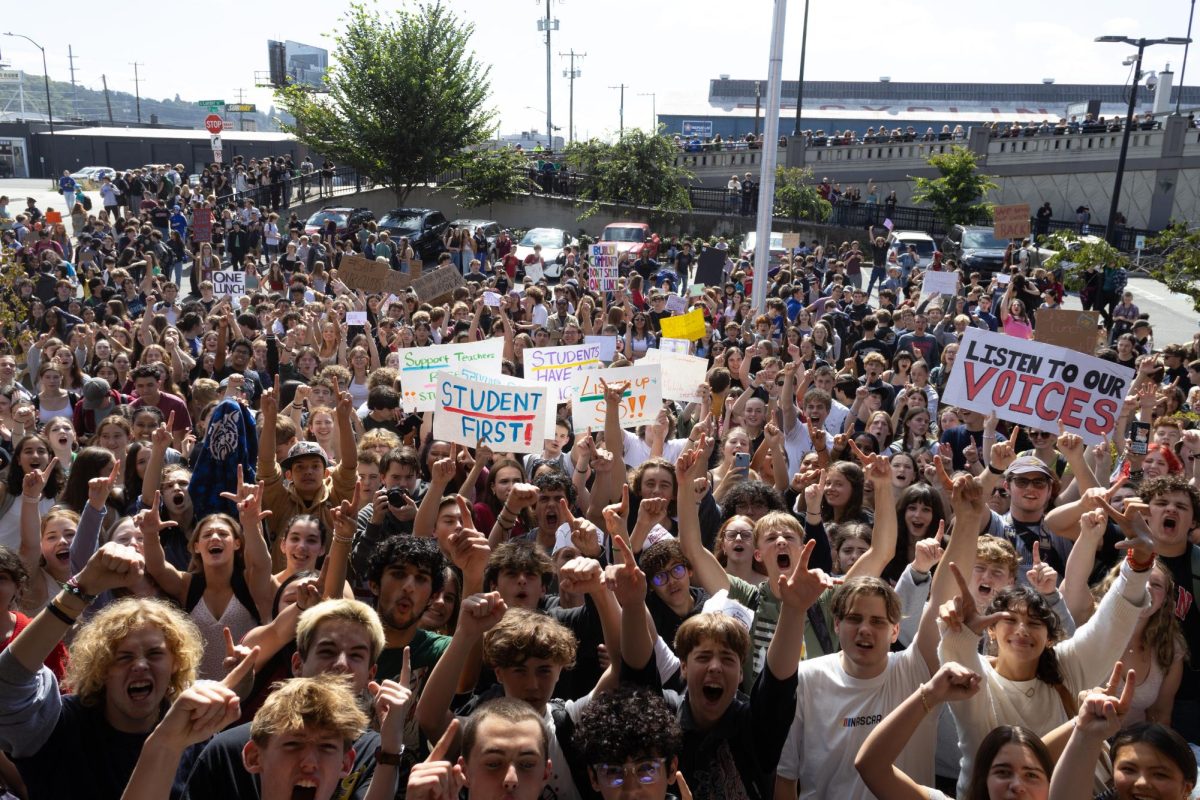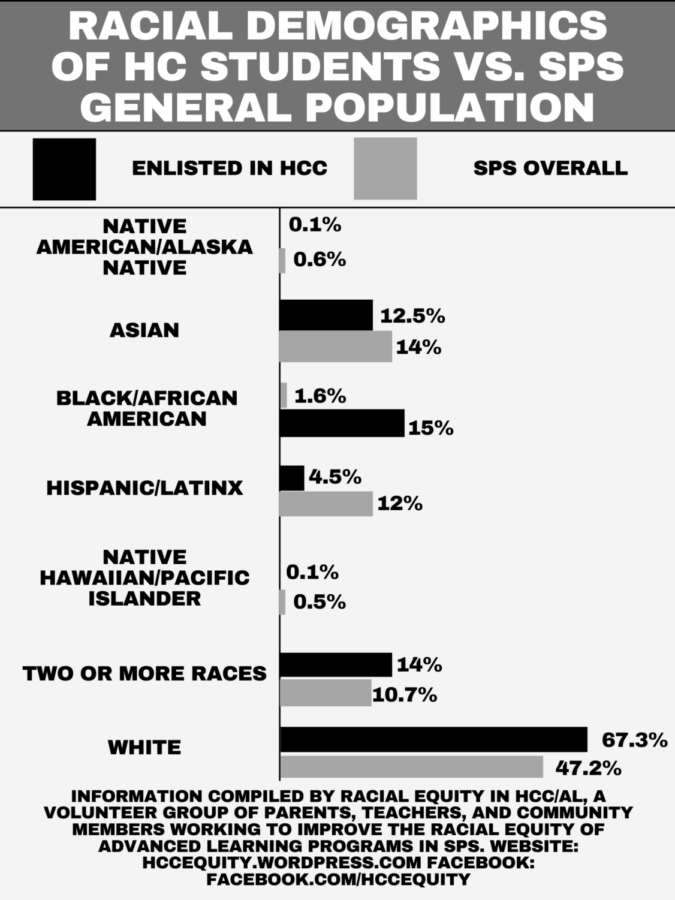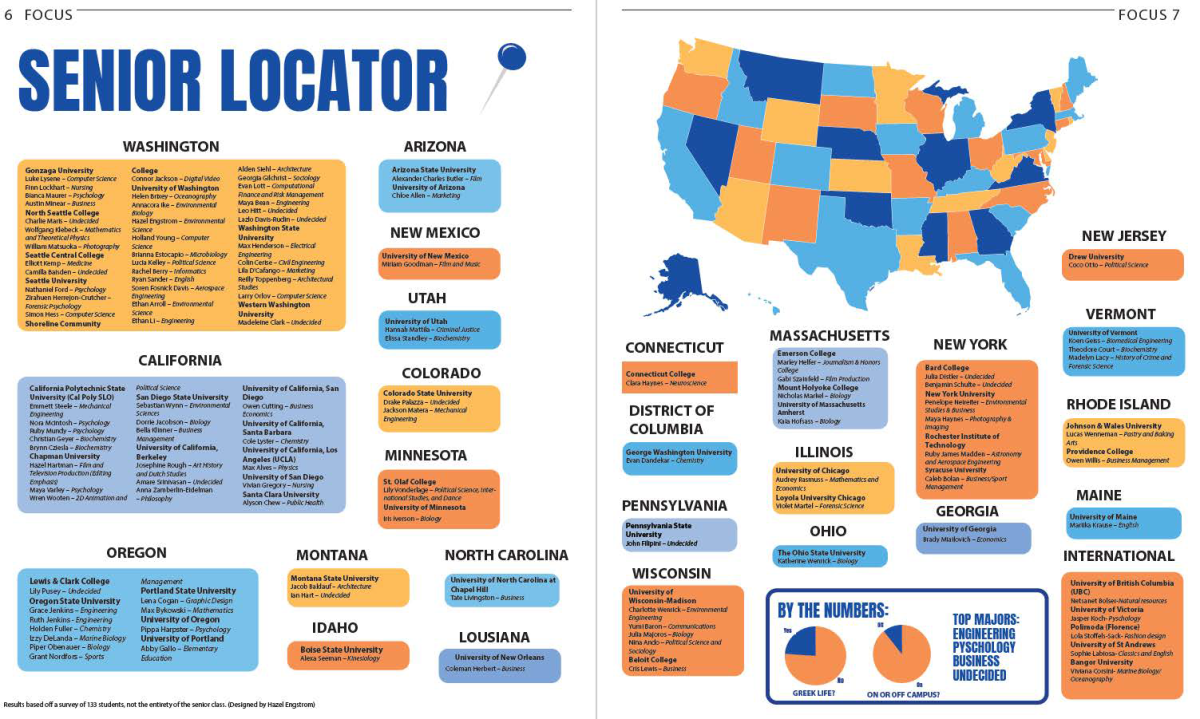Rethinking SPS honors policy
HCC to honors pipeline helps kids get ahead, but of what?
A survey conducted by the NAACP Youth Council found that both the socioeconomic and racial disparities within the HCC program are significant.
April 24, 2023
Ballard offers honors classes to all students when course selection occurs. Students can choose to check the small box next to sophomore year “World Lit and Comp – Honors” instead of general education. From the outside, it’s all so easy. Maybe a student has an extra homework problem on occasion, or maybe they have to write three essays instead of two, but it’s so accessible—right?
BACKGROUND
Advanced Placement (AP) and honors classes are programs that aim to help students prep for college coursework. They’re often more challenging and cover more content, and both will boost a weighted GPA—half a point for honors and a full point for AP. While transcripts don’t list weighted GPAs, things like class rank, college credits and college applications are affected by whether or not a student takes these classes over general offerings.
One of the determining factors of whether or not a student will be encouraged to enter honors classes is whether or not they participated in a K-8 program called HCC, or Highly Capable Cohort. It’s about as pretentious as it sounds. The program offers young kids an opportunity to take accelerated humanities and STEM courses. Students are chosen for eligibility based on standardized test scores, grades and other academic records.
HCC is not required to qualify students for AP, honors or International Baccalaureate (IB) classes, but students from HCC programs are far more likely to enter those more advanced courses. In my personal experience as a former HCC kid, this “Cohort” leads to greater academic self-confidence, but it also fosters a false sense of superiority over other learners.
INEQUITABLE
The reality of the HCC program is that it’s been built on segregation. A survey conducted by the NAACP Youth Council found that both the socioeconomic and racial disparities within the HCC program are significant.
Studies show that the standardized tests used to qualify students into HCC have consistently been beneficial to wealthier students. Preparatory classes are expensive, and many of the resources to do well are barred by financial inequities.
A study done by Seattle Public Schools in 2020 shows the ways those wealth disparities also represent racial disparities. While 15% of SPS students are African American, only 1.8% of HCC-eligible students are black; by comparison, while only 45.6% of SPS students are white, 63.2% of HCC-eligible students are white. Similar disparities can be shown for other BIPOC groups, such as indigenous, Latinx and Pacific Islander students.
Once you look slightly under the surface, you can easily see the racist reality of this system. Isolating select students, giving them special resources and telling them that they’re better than the other kids is a sure-fire way to perpetuate racism in a public school.
ARGUMENT FOR?
Now that there’s no question that the current system favors wealthy white kids, some concessions must be made. Not every kid learns the same way, and the idea of “general” education is definitely dysfunctional.
I can tell you, based on personal anecdote, that my time in my general education during elementary school made me miserable. My teacher didn’t like me because I was a disruptive student due to my boredom; I would read instead of doing my math homework, and I’d teach my friends crafts instead of paying attention to class activities. When I tested into HCC, my classes began to feel engaging and exciting, and my behavioral issues dropped away.
I have great difficulty within the discussion of honors policy. The system, as we know it, contains many crippling flaws that render it useless. The problem is that the system is actually supposed to promote the very equity it hurts. Not every learner is the same.
IT WAS CAPITALISM ALL ALONG…
The thought I keep coming back to is that our current education system doesn’t actually promote learning; it promotes getting ahead. Students are encouraged by parents, colleges, educators and peers to choose classes that check off that honors box, regardless of whether it’s the right decision for them.
Our factory-style school system is not effective in promoting students with diverse learning styles. It’s not even a matter of speed of learning, but also what’s most effective for the individual.
I know I’m the most successful in discussion-based classes, but I have friends who freeze during discussions and would much rather independent work. I know people who can learn the most by making diagrams and maps and others who can absorb anything they need from copying notes out of a textbook.
Simply put, not everyone learns the same way or at the same pace, and that shouldn’t distinguish people, especially developing teens, as better or worse than their peers.
The inequity I mean to illustrate is that children in a school system are not pushed to be curious or work harder by being offered honors classes; they are pushed to be better workers. I would be fascinated to see what happens when schools stop valuing individuals based on how much they can buy into the system and start valuing students—children—based on their individuality and the unique abilities they hold.
This also ties into the racial inequities we see in HCC, and in turn, honors. It doesn’t benefit our current system to promote equality or individuality among students because the current system is built on the back of racial inequality for the purpose of white promotion. It doesn’t benefit our current system to promote people of different races, genders, sexual orientations, cultural backgrounds or financial backgrounds because what our society intrinsically looks for is the best, brightest, most efficient, most conforming little worker bee who won’t mess with our societal standards. Our students are not exempt.
School, for me, has always been a safe haven. I’ve been incredibly lucky to happen to check the boxes that result in academic success, and it’s frustrating to see that those same boxes become barriers for many of my peers. Education is supposed to be about becoming a whole person, and what I keep seeing is that it ends up just being about conformity to a list of standards.
I understand that what I want to see in a public education system is almost entirely impossible. Bare minimum needs are barely being met by funding, and the kind of systemic change in approach of academics necessary to actually benefit all students as opposed to the current economy is so far out of reach it hurts. As we approach honors policy and the way we present courses to students, all I ask is that we remind ourselves that school is about creating people, not a profit.




















